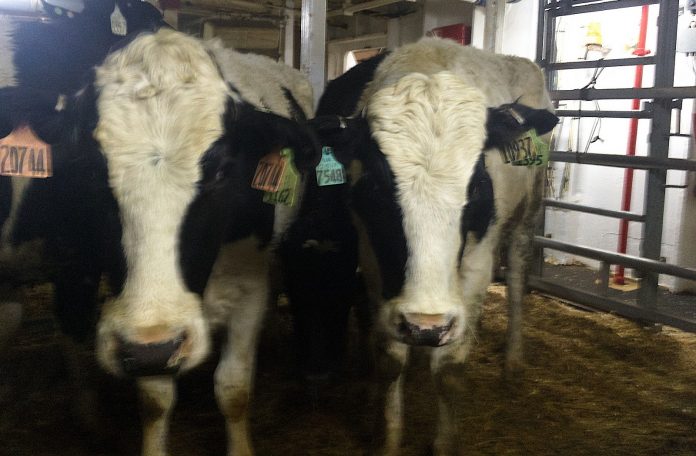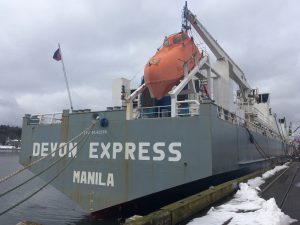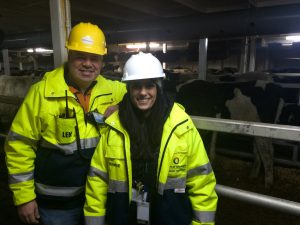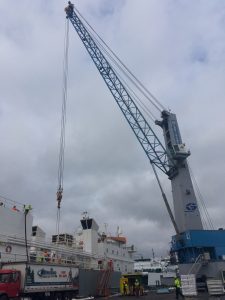
The Port of Olympia believes in the power of strong relationships built on trust that the job will always get done. No matter the conditions, cargo will move safely, and on schedule. This past dairy cattle shipment was a true testament to the effective teamwork along the working waterfront.

At cattle ranches in California and Idaho, hundreds of black and white Holstein cattle load onto trucks for a journey to Schorno Agri-Business in Yelm. Once the cattle are given a final inspection by United States Department of Agriculture (USDA) veterinarians, they are loaded up for a short 40-minute trip to the Port of Olympia. The cattle ship the Devon Express, already inspected by the USDA and loaded with bedding and feed at the Port, waits for the dairy heifers. Once the Holsteins are on board, they will embark on a three-week voyage across the Pacific Ocean to Vietnam.
It’s a journey that seems relatively straightforward in print, however the coordination of so many moving parts is far from simple. Unlike stereos or shoes, an ocean transit shipment of hundreds of cattle requires some out-of-the-box problem solving. There were a number of challenges in coordinating this shipment beginning with the US government shutdown and its impact on USDA inspections. Contributing to challenging timing, the Devon Express faced rough seas on its transit across this Pacific delaying its arrival. Finally, just as the Devon was pulling into port, Olympia experienced a massive winter snowfall requiring practically all hands-on deck at the Port to focus on snow clearing operations, so all the pieces could come together to get the cattle shipped.

Livestock shipments are not common, but they are increasing, says Len Faucher, marine terminal director. Even without the government shutdown, rough seas and the snowstorm, there can always be challenges to shipments. Through teamwork and contingency planning, the dedicated employees of the port have participated in five successful livestock shipments in the past four years.
Recently, Vietnam has developed a public health initiative to improve child nutrition. The initiative encourages families to serve children one glass of milk every day. These Holstein cattle will be used to produce milk for Vietnam, as well as serve as breeding stock to help build up their dairy industry. As the populations of Vietnam and other Asian countries grow, the opportunities for trade through west coast niche ports expand.
Thinking Outside the Container
Specialty shipments are nothing new for the Port of Olympia, which fills a special niche in the shipping industry. “These cargoes require creative thinking,” says Faucher. “You have to be very precise in your moves, and we have great teamwork between longshore, management, maintenance, the stevedore, and the customer to ensure the success of every shipment.” All specialty shipments rely on problem-solving and the ability to anticipate, adapt, and overcome challenges, Faucher explains, but the live cargo is one of the most demanding. “You cannot just leave cattle on trucks waiting, you have to make the live animal the top priority,” he adds.

Photo credit: Holly Reed
If it doesn’t fit in a container it usually finds its way through a niche port, like the Port of Olympia. Not only has the Port facilitated the movement of livestock, but it has also participated in moving other specialty goods like timber, wind turbine blades, bulk grains and other unique cargos. “These cargos are important and essential for global trade, and niche ports like the Port of Olympia are critical to moving specialty cargo in and out of the U.S.,” says Faucher.
Building a Dynamic Economy and a Strong Community
The Port of Olympia has been a part of Olympia since 1922 and trade through the Port benefits the local economy in many ways. While the shipments via the marine terminal are the most visible impact, they are far from the only one. The Port employs longshore, management, maintenance and other staff. Crewmembers and visitors working aboard the ships, come ashore and spend money at local restaurants and businesses downtown and throughout the area.
And the Marine Terminal is just one component of the Port. The Port operates four major business lines: the downtown Olympia Marine Terminal, Swantown Marina & Boatworks, Olympia Regional Airport and many real estate opportunities throughout Thurston County. Whether you are stopping by the Olympia Farmers Market to shop, taking a stroll along Billy Frank Jr. Trail, having dinner at Anthony’s Hearthfire Grill or visiting the Hands On Children’s Museum with your kids, you are experiencing parts of the community made possible by the Port of Olympia’s real estate investments.
Take a look around Thurston County and no matter where you are, you will probably find something that has been impacted by the Port of Olympia.
If you would like to know more about the Port of Olympia, visit www.portolympia.com.
Sponsored



















































